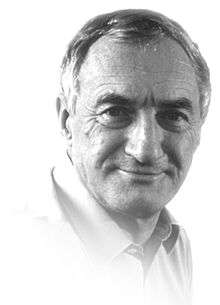Rupert Riedl

Rupert Riedl (22 February 1925, Vienna – 18 September 2005, Vienna) was an Austrian zoologist.
Biography
Riedl was a scientist with broad interests, whose influence in epistemology grounded in evolutionary theory was notable, although less in English-speaking circles than in German or even Spanish speaking ones. His 1984 work, Biology of Knowledge: The evolutionary basis of reason examined cognitive abilities and the increasing complexity of biological diversification over the immense periods of evolutionary time.
Riedl built upon the work of the Viennese school of thought initially typified by Konrad Lorenz, and continued today by Gerhard Vollmer, Franz Wuketits, and in Spain by Nicanor Ursura, skeptical of German idealism, and nourished by the tradition that produced Ernst Mach, Ludwig Boltzmann, Erwin Schrödinger, Karl Popper, Hans Reichenbach and Sigmund Freud.
Konrad Lorenz believed that the Kantian framework of cognitive concepts such as three-dimensional space and time were not fixed but built up over phylogenetic history, potentially subject to further developments. Lorenz’s position, as expanded by Rupert Riedl, attempts to make it easier to assimilate non common sense physical scientific areas such as quantum field theory and string theory.
Riedl drew clear distinctions between the deductive and inductive (non conscious) cognitive processes characteristic of the left and right cerebral hemispheres. His analysis of what he called “the pitfalls of reason” deserves special attention. He, like Lorenz, was concerned with cognitive processes that might endanger the future of civilization.
Riedl had less direct influence on academic philosophy than his profound influence on the thinking of investigators in neuroscience such as Michael Gazzaniga, Antonio Damasio, and Vilayanur S. Ramachandran, whose investigations combine synergistically with those of more physiologically-oriented scientists such as Eric Kandel and Rodolfo Llinás, as well as computational models that take advantage of the techniques of systems dynamics as practiced by Denis Noble and P. Read Montague.
Riedel contributed to developmental biology, morphology, evolution (a systems approach) and evolutionary epistemology.
He was the Founder President of the Club of Vienna.
Evolutionary views
Riedl held the opinion that the modern evolutionary synthesis had ignored the role of development and morphology in evolution. He stated that the modern synthesis had failed to explain the origin of body plans and patterns at the macroevolutionary level.[1] He presented his evolutionary theory in Order in Living Organisms: A Systems Analysis of Evolution (translated, 1978). He called for an extended evolutionary synthesis to integrate processes from developmental biology and macroevolutionary perspectives. He was one of the first scientists to study the concept of evolvability.[1][2]
Education and teaching
- 1945: Riedl started studies in fine arts, medicine, anthropology but at the end he degree in Biology with specialization in zoology at the University of Vienna in 1951.
- 1956: assistant professor, University of Vienna
- 1960: State doctorate and professor at the University of Vienna
- 1967 guest professor at the University of North Carolina in Chapel Hill
- from 1968: full professor und research professor of Marine Sciences at the University of North Carolina
- From 1971: chief of the Institut of Zoology und Temporary chief of the Institut of Humanbiology, both University of Vienna, and Visiting Professor at the University of North Carolina
- 1983-1990: chief of the Institut of Zoology und Anthropology at the University of Vienna
Works
- Riedl, R. (1978) Order in Living Organisms: A Systems Analysis of Evolution. New York: Wiley.
- Riedl, R. (1983) (ed.) Flora und Fauna des Mittelmeeres. Hamburg: P. Parey.
- Riedl, R. (1984) Biology of Knowledge: The Evolutionary Basis of Reason. Chichester: John Wiley & Sons.
See also
References
- 1 2 Wagner, Günter P; Laubichler; Manfred D. (2004). "Rupert Riedl and the Re-Synthesis of Evolutionary and Developmental Biology: Body Plans and Evolvability". Journal of Experimental Zoology (Mol Dev Evol) 302B: 92-102.
- ↑ Müller, Gerd B. (2006). Rupert Riedl’s Path of Cognition. Biological Theory 1: 188-190.